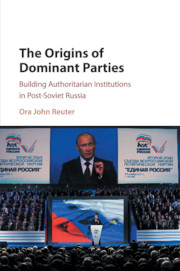Crossref Citations
This Book has been
cited by the following publications. This list is generated based on data provided by Crossref.
Burkhardt, Fabian
2017.
The institutionalization of relative advantage: formal institutions, subconstitutional presidential powers, and the rise of authoritarian politics in Russia, 1994–2012.
Post-Soviet Affairs,
Vol. 33,
Issue. 6,
p.
472.
Marques, Israel
2017.
Political Connections and Non-Traditional Investment: Evidence from Public-Private Partnerships in Vocational Education.
SSRN Electronic Journal,
Reuter, Ora John
and
Szakonyi, David
2017.
Elite Defection Under Autocracy: Evidence from Russia.
SSRN Electronic Journal ,
Smyth, Regina
and
Turovsky, Rostislav
2018.
Legitimising Victories: Electoral Authoritarian Control in Russia’s Gubernatorial Elections.
Europe-Asia Studies,
Vol. 70,
Issue. 2,
p.
182.
Baturo, Alexander
and
Elgie, Robert
2018.
Why do authoritarian regimes adopt bicameralism? Cooptation, control, and masking controversial reforms.
Democratization,
Vol. 25,
Issue. 5,
p.
919.
Gel’man, Vladimir
2018.
Bringing actors back in: political choices and sources of post-Soviet regime dynamics.
Post-Soviet Affairs,
Vol. 34,
Issue. 5,
p.
282.
Wengle, Susanne
and
Evans, Christine
2018.
Symbolic state-building in contemporary Russia.
Post-Soviet Affairs,
Vol. 34,
Issue. 6,
p.
384.
Somer, Murat
and
McCoy, Jennifer
2018.
Déjà vu? Polarization and Endangered Democracies in the 21st Century.
American Behavioral Scientist,
Vol. 62,
Issue. 1,
p.
3.
Marquardt, Kyle L
2018.
The regional roots of Russia’s political regime.
Cambridge Review of International Affairs,
Vol. 31,
Issue. 3-4,
p.
365.
Bäcker, Roman
and
Rak, Joanna
2019.
Epigonic Totalitarianism in Russia.
Politeja,
Vol. 16,
Issue. 5(62),
p.
7.
Frye, Timothy
Reuter, Ora John
and
Szakonyi, David
2019.
Vote Brokers, Clientelist Appeals, and Voter Turnout: Evidence from Russia and Venezuela.
World Politics,
Vol. 71,
Issue. 04,
p.
710.
Washida, Hidekuni
2019.
The origins and (failed) adaptation of a dominant party: The UMNO in Malaysia.
Asian Journal of Comparative Politics,
Vol. 4,
Issue. 1,
p.
61.
REUTER, ORA JOHN
and
SZAKONYI, DAVID
2019.
Elite Defection under Autocracy: Evidence from Russia.
American Political Science Review,
Vol. 113,
Issue. 2,
p.
552.
Hale, Henry E.
2019.
A surprising connection between civilizational identity and succession expectations among Russian elites.
Post-Soviet Affairs,
Vol. 35,
Issue. 5-6,
p.
406.
Hernández Company, José Antonio
2019.
Parallel authoritarian powers: an explanation of Mexico’s authoritarian regime breakdown.
Democratization,
Vol. 26,
Issue. 3,
p.
465.
Kasuya, Yuko
and
Sawasdee, Siripan Nogsuan
2019.
The transformation of dominant parties in Asia: Introduction to the special issue.
Asian Journal of Comparative Politics,
Vol. 4,
Issue. 1,
p.
3.
Meng, Anne
2019.
Accessing the state: Executive constraints and credible commitment in dictatorship.
Journal of Theoretical Politics,
Vol. 31,
Issue. 4,
p.
568.
Isaacs, Rico
2020.
The Role of Party Interest Articulation in the Personalist-Authoritarian Regimes of the Central Asian Republics of Kazakhstan, Turkmenistan, and Tajikistan.
Problems of Post-Communism,
Vol. 67,
Issue. 4-5,
p.
375.
Мельвиль, Андрей
2020.
Выйти из “гетто”: о вкладе постсоветских исследований/Russian Studies в современную политическую науку.
Полис. Политические исследования,
p.
22.
Hassan, Mai
2020.
Regime Threats and State Solutions.



